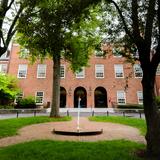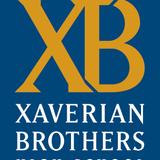The mission of Thayer Academy is to inspire a diverse community of students to moral, intellectual, aesthetic, and physical excellence so that each may rise to honorable achievement and contribute to the common good.
Thayer Academy provides a rigorous and challenging college preparatory education that attracts students from diverse social, ethnic, economic, and academic backgrounds.
The Academy seeks to equip students with the skills, knowledge, and experiences to realize their potential in college and beyond.
At Thayer we believe that students will find academic success when given opportunities for individual achievement and self-expression.
The Thayer curriculum strives to instill fundamental knowledge and study skills while stimulating intellectual curiosity and growth.
Furthermore, the curriculum and Thayer environment combine to encourage students to understand and appreciate different cultures, develop critical thinking skills, enhance creativity, promote physical and emotional well-being, and foster a concern for others.
Quick Stats (2025)
- Top Ranked MA School
- Grades: 5-12
- Enrollment: 686 students
- Yearly Tuition: $36,575
- Acceptance rate: 38%
- Average class size: 15 students
- Application Deadline: Feb. 1
- Source: Verified school update
Top Rankings
Thayer Academy ranks among the top 20% of private schools in Massachusetts for:
Category
Attribute
Acceptance Rate
Student Body
School History
School Overview
Religious Affiliation
Grades Offered
Grades 5-12
Learning Difference Programs
Yes
Learning Programs Supported
mild language based and mild learning differences
Year Founded
1877
Student Body
Total Students
686 students
Student Body Type
Co-ed
% Students of Color
20%
State avg.: 29%
Students by Grade

Academics and Faculty
Total Classroom Teachers
112 teachers
Student : Teacher Ratio
6:1
National avg.: 13:1
% Faculty w/Advanced Degree
70%
Average Class Size
15 students
Number of AP Courses
13 courses
List of Courses Offered
Matriculation DataMatric. Data
Classroom Dress Code
Casual
Mon =dress up; Tues-Fri = no blue jeans and no tee-shirts
Tuition and Acceptance Rate
Admission Deadline
Feb. 1
Yearly Tuition Cost
$36,575
% on Financial Aid
35%
Average Financial Aid Grant
$24,000
Acceptance Rate
38%
National avg.: 85%
Admissions Director
Jon White
Admissions Associate
Jessica Leaver
School Notes
- The mission of Thayer Academy is to inspire a diverse community of students to moral, intellectual, aesthetic, and physical excellence so that each may rise to honorable achievement and contribute to the common good. Thayer Academy provides a rigorous and challenging college preparatory education that attracts students from diverse social, ethnic, economic, and academic backgrounds. The Academy seeks to equip students with the skills, knowledge, and experiences to realize their potential in college and beyond. At Thayer we believe that students will find academic success when given opportunities for individual achievement and self-expression. The Thayer curriculum strives to instill fundamental knowledge and study skills while stimulating intellectual curiosity and growth. Furthermore, the curriculum and Thayer environment combine to encourage students to understand and appreciate different cultures, develop critical thinking skills, enhance creativity, promote physical and emotional well-being, and foster a concern for others.
Source: Verified school update
Frequently Asked Questions
How much does Thayer Academy cost?
Thayer Academy's tuition is approximately $36,575 for private students.
What is the acceptance rate of Thayer Academy?
The acceptance rate of Thayer Academy is 38%, which is lower than the national average of 69%. Thayer Academy's acceptance rate is ranked among the top private schools in Massachusetts with low acceptance rates.
What is Thayer Academy's ranking?
Thayer Academy ranks among the top 20% of private schools in Massachusetts for: Lowest average acceptance rates, Largest student body and Oldest founding date.
When is the application deadline for Thayer Academy?
The application deadline for Thayer Academy is Feb. 1.
School Reviews
Endorse Thayer Academy. Endorsements should be a few sentences in length. Please include any comments on:
- Quality of academic programs, teachers, and facilities
- Availability of music, art, sports and other extracurricular activities
- Academic or athletic awards
Recent Articles

A Parent's Guide To Understanding High School Teaching Methods
This comprehensive guide helps parents navigate the various teaching methods used in today's high school classrooms. By understanding these approaches, you'll be better equipped to support your teen's learning journey, communicate effectively with teachers, and create a complementary learning environment at home.

February 08, 2025
Social Emotional Learning: Education's Hidden SymphonyA musician's perspective on Social Emotional Learning reveals how this educational framework orchestrates success through five essential emotional competencies.

January 24, 2025
A Roadmap For Starting A Private SchoolUse this roadmap as a set of talking points with your trusted mentors and professionals to start the private school of your dreams. You're not alone. Over the years, hundreds of folks like you have had the same dream. From Quintilian to Maria Montessori to Lucy Madeira Wing, visionary educators have established schools to teach according to their beliefs and methodologies.






![Thayer Academy varsity home game against Milton Academy varsity Lots of dunking INSANE THREE POINTERS Thayer Academy vs Milton Academy First half. [!!DUNKING!!] Insane…](https://i.ytimg.com/vi/Y9rxlEg1nKc/0.jpg)















